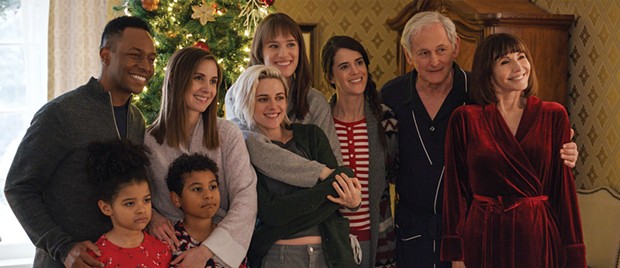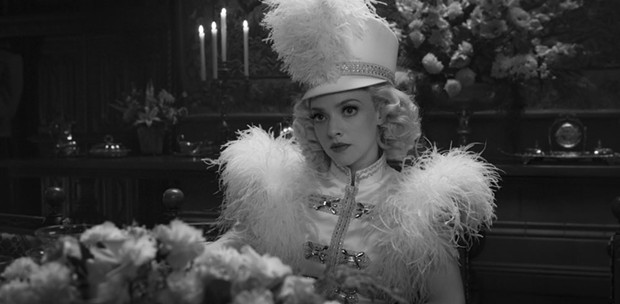[
{
"name": "Top Stories Video Pair",
"insertPoint": "7",
"component": "17087298",
"parentWrapperClass": "fdn-ads-inline-content-block",
"requiredCountToDisplay": "1"
}
]
HAPPIEST SEASON. Having made no secret of my childlike but abiding love of Christmas movies and despite our conventional notions of time and meaningful dates of demarcation having slipped away in 2020, I feel compelled to watch them. Maybe it's a passive version of the denial that has led swaths of the populace to wantonly infect each other, maybe a minor act of nostalgia — hard to say. But the tree is trimmed, stockings by the chimney (not far from a similar display of masks), the door is bolted and I'm watching holiday movies.
My editor beat me to the punch reviewing Jingle Jangle, which, out of performative sour grapes, I have yet to see. Happily, there is the latest from actor/writer/director Clea Duvall who, with co-writer Mary Holland and a tremendous cast, has gifted us with Happiest Season, a thoughtful, seasonally bedecked, sometimes goofy romantic comedy with a firm perspective and something to say about acceptance, expectation and human experience.
In Pittsburg (for some reason) Abby (Kristen Stewart) and Harper (Mackenzie Davis), are in love. Despite Abby's general antipathy for the holiday, she agrees to forgo her usual Christmas routine of pet sitting for friends and go home with Harper, armed with a ring and a plan to propose on Christmas morning. A challenge emerges en route, however, when Harper informs her beloved that reports of her parents' warm reception to her coming out the previous summer had been greatly exaggerated. By Harper herself. And that, in fact, no such event had transpired, leaving the parents with the distinct impression that Harper is simply between boyfriends and Abby is her orphaned roommate — a lie by omission, if one believes in that sort of thing. Furthermore, Harper's father Ted (Victor Garber) is actively courting a conservative donor/influencer in his bid for mayor, so mum's the word. This all before Abby even meets the family, which includes perfectionist stress-case mom Tipper (Mary Steenburgen), lovable black sheep sister Jane (Mary Holland) and lawyer turned gift basket entrepreneur sister Sloane (Alison Brie), the last with her own adorable, cut-from-a-catalog but clearly troubled family unit in tow.
The house becomes an impeccably decorated pressure-cooker for Abby as soon as she walks in the door and she can't seem to put a foot right. When she's introduced to Harper's ex-boyfriend Connor (Jake McDorman), whose photographs still adorn the family end tables and then to Riley (Aubrey Plaza), the girlfriend Harper spurned and threw to the wolves of "family values," Abby might start to wonder about the return policy on the engagement ring in her luggage.
Happiest Season may not be perfect, its plot perhaps a little predictable, the timing of the gags slightly uneven, but it succeeds mightily in subverting a staid form without trying to be subversive at all. It's a home-for-the-holidays story told from the perspective of characters who have so often been marginalized, reduced to punch lines or local color. By telling the story in the most traditional form, complete with soothing hot toddy atmosphere of a classic Hollywood Christmas movie, it reinforces that there is no truth to the notion of "non-traditional" couples or families or relationships; everybody squabbles at the holidays. Well, maybe not this year. PG13. 102M. HULU.
MANK. These comments will be, for most, mercifully brief. Not because Mank is an insignificant work (quite the opposite), or because I didn't care for it (I loved every minute), but because it is a scholarly text that references another, examinees a particular industry as microcosm of the country that created it and then gets into the really heady stuff about the lie of meritocracy, the hopelessness of idealism in the face of greed and the risks inherent in challenging the status quo of the rich and powerful.
David Fincher hasn't made a feature since Gone Girl (2014). He's been busy forming a strategic alliance with Netflix, unquietly decrying the lack of curiosity and courage of conventional Hollywood and, it would seem, preparing Mank (screenplay by his late father Jack), which might be the best thing he's ever done.
In the midst of the Great Depression, with war noisily taking shape in Europe, Hollywood is hiring. Writers are brought to California from far and wide with the (often false) promise of easy wealth. Radio and theater wunderkind Orson Welles (Tom Burke) has been given an unprecedented carte-blanche contract at RKO. He, in turn, has hired acerbic iconoclast Herman J. Mankiewicz (Gary Oldman) to draft a screenplay for his first project. Mank, cast into the desert with a broken leg, long-suffering attendants Fraulein Freda (Monika Grossmann) and Rita Alexander (Lily Collins), and orders to abstain from alcohol (he doesn't), has two months to make a masterpiece (he does). A tall enough order but the script in question is also an indictment of William Randolph Hearst (Charles Dance) and the system of media influence and corporatocracy that made Hearst one of the most influential figures of the 20th century and, arguably, destroyed American democracy. Oh, and Herman and his wife Sara (Tuppence Middleton) had been not infrequent guests of Hearst's at San Simeon, with Mank forming a particularly close friendship with the big man's lady friend Marion Davies (Amanda Seyfried). It's a lot and I'm not even scratching the surface.
Of course, the screenplay in question became Citizen Kane, which both made and destroyed the careers of both Makiewicz and Welles, and is one of the most innovative and important works of art of the 20th century. Its authorship was hotly contested from the beginning, its narrative and stylistic moves have been stolen continuously all along, and I can hardly add to the scholarship about it.
Fincher can, though, and has done, as perhaps no one else could. Using the techniques of the 1930s and '40s, he has created a thoroughly modern, breathtakingly beautiful movie that comments with great sophistication on art, business, politics and social justice (just to name a few) that is also compulsively watchable and emotionally engaging from first frame to last. R. 131M. NETFLIX.
John J. Bennett (he/him) is a movie nerd who loves a good car chase.
Speaking of...
-

Challengers Rises to the Challenge
May 2, 2024 -

Team Efforts
Apr 25, 2024 -

Civil War's Victory
Apr 18, 2024 - More »
more from the author
-
Challengers Rises to the Challenge
- May 2, 2024
-
Team Efforts
- Apr 25, 2024
-
Civil War's Victory
- Apr 18, 2024
- More »

































